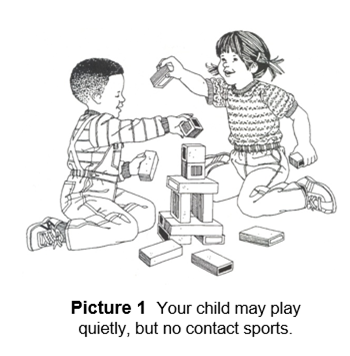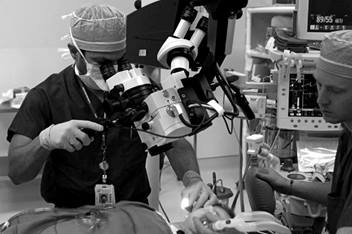Ear Surgery: Care after Tympanoplasty and/or Mastoidectomy

Your child has had an ear operation, either a tympanoplasty (tim-PAN-oh-plas-tee) or a mastoidectomy (mass-toyd-EK-tuh-me). There are a few things you should do for your child at home.
After Surgery
The operated ear is usually packed with Gelfoam® (a material that absorbs blood). It will feel clogged and your child may hear crackling sounds. The most important thing to remember is to keep the ear dry.
The temple and area around the eye socket (orbit) on the affected side may also become a little swollen.
The first day after surgery your child may have some vertigo (dizziness), nausea or vomiting. If your child is experiencing these symptoms, a liquid or bland diet (like crackers, broth, or Jell-o®) is recommended. A regular diet may be started the when these symptoms resolve.
What to Expect
These are some symptoms that may follow any ear operation:
- A different taste and dryness in the mouth - Your child may notice this for a few weeks after surgery. The taste change is usually described as a metal taste on one side of the tongue. In some patients, the symptoms can be permanent due to an affected nerve in the middle ear.
- Tinnitus - Your child may hear a ringing or buzzing sound before surgery and usually will hear it for a while after surgery. This is called tinnitus. It may last for one to two months and then stop as the hearing gets better, or it may last longer.
- Ear numbness - For a while after surgery your child may lose some feeling in the skin in and around the ear. This numbness may involve the whole outer ear or only the top half. Loss of feeling may last for as long as six months or it can be permanent.
- Jaw symptoms - The jaw joint is at the front of the ear canal. Some soreness or stiffness in the jaw often happens after ear surgery. It usually goes away within 1 to 2 months.
- Drainage behind the ear - The surgeon may need to insert a drain tube behind the ear. We usually do not know this before surgery begins. If a drain tube is used, it will be taken out after the operation.
- Ear pressure and dizziness - Ear “popping,” “cracking” noises or mild dizziness may happen because of the packing in the middle ear. It is normal for your child to feel dizzy or lightheaded for up to one week after surgery.
Home Care
- If your child has a dressing (bandage) wrapped around their head or sutures (stitches) behind the ear, keep that dressing dry and water off the area. The dressing can usually be removed 2 days after surgery, or when recommended by your child’s surgeon.
http://www.ghorayeb.com/TieOverDressing.html - It is very important to keep all water out of the ear canal. To do this, coat a cotton ball heavily with antibiotic ointment (like Bacitracin®) or Vaseline and place it in the outermost part of the ear. When you wash your child's face, keep the bandage or cotton ball dry. A shower cap gives extra protection.
- Wait 4 days after surgery before washing your child’s hair. Try to keep all water out of the ear canal.
- It is normal to see thick, dark or bloody ear drainage for up to a week after surgery. You may clean the crusting from the outer part of the ear with hydrogen peroxide and Q-tips®. Sometimes you may see brown or dark red pieces of packing (Gelfoam®) coming out from the ear canal. DO NOT try to replace this or remove the rest of the pieces that are still in the ear canal.
- If there is an incision behind the ear, it will be covered with small strips of tape called Steri-strips™ . These should be left in place for 10 to 12 days. All stitches are under the skin and will dissolve on their own. No care is needed for the Steri-strips. Just keep them dry and let them fall off on their own. You may gently remove them if they are still in place 2 weeks after surgery.
- Tell your child to sneeze with their mouth open. They should not try to hold the sneeze in. This avoids pressure build-up in the ear.
- Do not let your child chew any gum or blow bubbles with gum for 2 weeks after surgery. This can build up pressure in the ears and cause the incision to open.
- Keep your child from blowing their nose for at least 2 weeks after surgery. The pressure from blowing can cause the healing eardrum to move or shift. Sniffing is okay. After 2 weeks your child can gently blow their nose, one side at a time.
- Your child may have slight pain in their ear. Follow your doctor's instructions for pain relief. A prescription for pain medicine may be given. Be sure to follow the label instructions carefully.
- If antibiotics are prescribed, please give them as directed until they are gone. With some surgeries your child does not need to take antibiotics by mouth because antibiotics are already in the ear canal.
- When your child sleeps, they should try to sleep on the other ear.
Activity
- Your child may play quietly. They should avoid active or rough play and contact sports, such as football and soccer, until they are cleared by the surgeon a few weeks after surgery (Picture 1).
- No swimming until cleared by the surgeon.
- Ask your child’s doctor when your child may go back to school. This is usually after 1 to 3 days.
- No heavy lifting or bending until your child sees the doctor. This will prevent pressure from building up in their head.
- Avoid playing certain musical instruments, such as wind instruments or a trumpet, until cleared by the surgeon.
When to Call the Doctor
If any of these things happens, call your child’s doctor at (614) 722-6547 or (614) 722-2000 and ask for the ENT clinic. After regular office hours, ask for the ENT resident to be paged if:
- Your child complains of a lot of pain even after taking pain medicine.
- You see a large amount of bleeding, puss or foul-smelling drainage coming from your child's ear.
- Your child has a temperature over 101 degrees.
- There is redness in the ear area.
- Your child is very dizzy.
- There is a difference in the way your child’s face looks or moves on the side of the surgery.
Safety Tips and Other Advice
- Give the exact amount of medicine your doctor ordered.
- Do not let your child do anything that needs balance when taking painkillers.
- If the medicine is a liquid, use a pediatric measuring device (available at the pharmacy) to measure the exact dose. Do not measure liquid medicines in kitchen spoons.
- Stay with your child until they have swallowed the dose of medicine.
- Do not give more than 5 doses of medicine in a 24-hour period unless ordered by your child’s doctor.
- Store all medicine out of the reach of children.
- If your child or someone else takes too much of this medicine, first call the Central Ohio Poison Center at 1-800-222-1222 (TDD (614) 228-2272). They will tell you what to do.
Follow-up Appointment
Call the ENT clinic at (614) 722-3866 to schedule the follow-up visit if it has not already been scheduled.
If you have questions or if your child is having problems, call the ENT Nurse Triage Line (614) 722-6547, or in an emergency call the Hospital operator at (614) 722-2000 and ask for the ENT surgeon on call.
HH-I-33 | Copyright 2021, Nationwide Children’s Hospital

